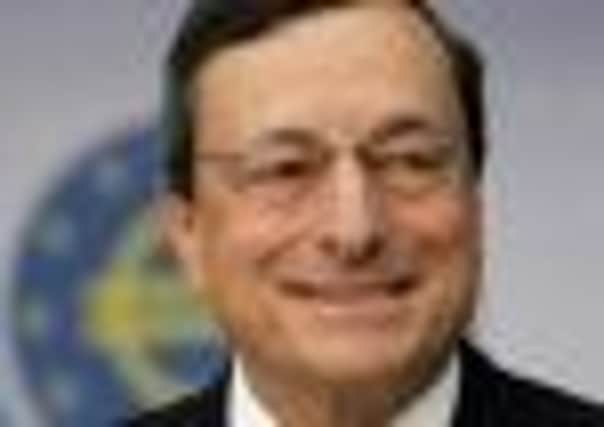European Central Bank to provide safety net for single currency


ECB president Mario Draghi said it would help tackle the “unfounded” fears of investors, worried about the euro’s survival.
The scheme, to which Germany’s Bundesbank reiterated its opposition, would focus on bonds maturing within three years and aims to create a safety net for the euro.
Advertisement
Hide AdAdvertisement
Hide Ad“Under appropriate conditions, we will have a fully effective backstop to prevent potentially destructive scenarios,” Mr Draghi said.
The plan, named Outright Monetary Transactions, will see the ECB buy unlimited amounts of the government bonds of countries struggling to manage their debts.
It is hoped large-scale purchases of short-term government bonds will drive up their price and push down their interest rate, or yield, making it less expensive for countries to borrow money.
The ECB’s pledge of support came with a caveat: countries that want the central bank to help with their debts must first seek emergency aid from the bailout funds managed by the 17 euro countries and submit their economic policies to the scrutiny of the International Monetary Fund (IMF). That puts enormous pressure on heavily indebted countries such as Spain and Italy, which have been reluctant to seek help from their euro partners.
Christine Lagarde, managing director of the IMF, welcomed the ECB plan and said her organisation stood “ready to co-operate”.
Analysts warned that, while the ECB plan would provide short-term relief to European countries and financial markets, it does not address underlying economic weakness across the region. Neil MacKinnon, global macro strategist at VTB Capital, said: “Without trying to be a ‘party pooper’, suppressed borrowing costs certainly provide relief in the short-term but do not resolve problems of solvency and debt unsustainability.”
Mr Draghi partly acknowledged those concerns in his statement, saying governments had “to push ahead with great determination” to bring down budget deficits.
Prime Minister David Cameron, who was in talks with French president Francois Hollande yesterday, welcomed the ECB move.
Advertisement
Hide AdAdvertisement
Hide AdHe said: “We need a European Central Bank that stands firmly and squarely behind the currency of the euro and is not only prepared to make those statements but to back those statements with real financial muscle and a clear plan.
“I think we are closer to that today than we have been for a very long time.”